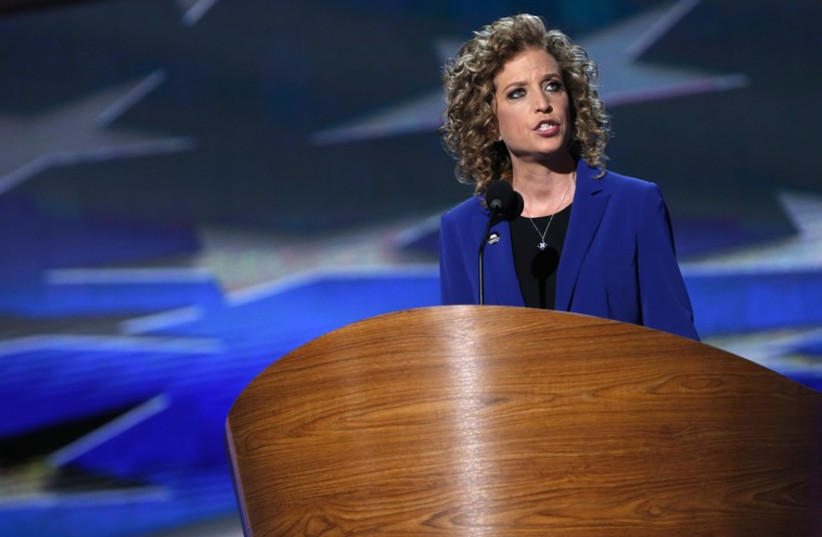More than a dozen Jewish members of Congress gathered on Friday for the first meeting of the US House of Representatives Jewish Caucus.
But following the meeting, held in the offices of Rep. Debbie Wasserman Schultz, an influential Jewish Democrat from Florida, it remains unclear what the caucus will stand for as the chamber’s Jews are deeply divided over the Israel-Hamas war and other issues. A statement from Wasserman Schultz’s office suggested the caucus was still finding its feet.
“We had a very-well attended, constructive meeting focused on how we can work together and develop our broader mission,” the statement said. “We did a lot of listening and considering one another’s opinions and thoughts. We left looking forward to continuing to engage in these discussions with our colleagues so that we can come together in consensus on how a secular Jewish Caucus can be most effective.”
The House has 26 Jewish lawmakers, all but two of them Democrats, and it is unclear which attended the meeting and whether either of the Republicans made it — especially because six congresspeople who RSVPed canceled at the last minute due to illness or sudden conflicts. Ohio Republican Max Miller had said he would attend, but he did not confirm whether he was there. Nor did Tennessee Republican David Kustoff.
Wasserman Schultz is alarmed at the spike in antisemitic attacks and rhetoric in the United States since Hamas terrorists massacred 1,200 people in Israel on Oct. 7, launching the current war in Israel and Gaza. She wants to formalize a united front among Jews in Congress to confront the hatred.

Jewish Caucus given the go-ahead
For decades, Jewish members of Congress had been gathering unofficially. Earlier this month, Axios reported that Wasserman Schultz got the go-ahead from House administrators to make the Jewish Caucus official — though it appears that not all Jews in the House believe the caucus should exist.
For the last decade, the unofficial gatherings were helmed by Rep. Jerry Nadler, a New York Democrat who is the longest-serving Jew in Congress. He told Axios that he would attend Friday’s meeting, but was concerned that the organizers — i.e., Wasserman Schultz — did not consult with all the Jews in the chamber before creating the caucus.
“In the rush to form this new group, by contrast, most Jewish members were left out of the discussion altogether,” he said. He also said the hurt feelings would be a distraction as the caucus seeks unanimity on the Israel-Hamas war.
There are currently official Black, Hispanic and Asian-Pacific caucuses in the House, and there are formal Jewish caucuses in state governments; one of the most active is in California. But one issue that may have prevented the formation of a House Jewish Caucus until now is the age-old question of what “Jewish” means.
A concern reported by Axios — which has long been discussed among Jews in the US Capitol — is that some Jewish lawmakers fear setting the precedent of establishing an explicitly religious caucus — especially because Jews tend to cherish the separation of church and state. That may be why Wasserman Schultz’s statement included the word “secular” right before “Jewish Caucus.”
Another fear is that the wide differences among members of a Jewish Caucus would undermine its purported purpose: Jewish unity.
In late October, Nadler wrangled all 24 Jewish Democrats into signing a statement backing the Biden administration’s robust support for Israel in its war against Hamas. Within weeks, that united front was crumbling, as a number of Jewish Democrats joined calls for a ceasefire.
Beyond differences about the war, there are vast differences among Jews in Congress over, well, everything. Wasserman Schultz sought, and got, Miller’s membership in the caucus, making it the only one of the ethnic caucuses to have bipartisan membership. But Miller is among the most enthusiastic endorsers of former President Donald Trump, while the caucus also includes Nadler and Reps. Jamie Raskin of Maryland, Dan Goldman of New York and Adam Schiff of California — all of whom played leading roles in one or both impeachments of Trump. Schiff and Trump routinely express the hope that the other is jailed.
Some members, such as Florida Democrat Jared Moskowitz (who hoped to attend but was unable to), see Jews as an ethnic minority subject to persecution.
“At a time when there’s people marching through the streets with signs calling to ‘Gas the Jews,’ it is absolutely critical that Jewish members form a united front against antisemitism and for the safety and security of the Jewish people,” Moskowitz told the Jewish Telegraphic Agency.
The sensitivity of the get-together made even the most voluble of lawmakers clam up about it. A number of spokesmen promised to get back to the Jewish Telegraphic Agency about whether their bosses were in attendance but never did. A spokeswoman for Vermont’s Becca Balint, a Democrat who joined Congress earlier this year, simply said that she was not in attendance.
Kathy Manning, a North Carolina Democrat, attended the meeting and said it centered on the need to confront antisemitism.
“I’m pleased to join in the founding of the Congressional Jewish Caucus,” she said. “During this time of rising antisemitism, it’s imperative that the Jewish community have its unique experience and perspective represented at the leadership table in Congress.”
